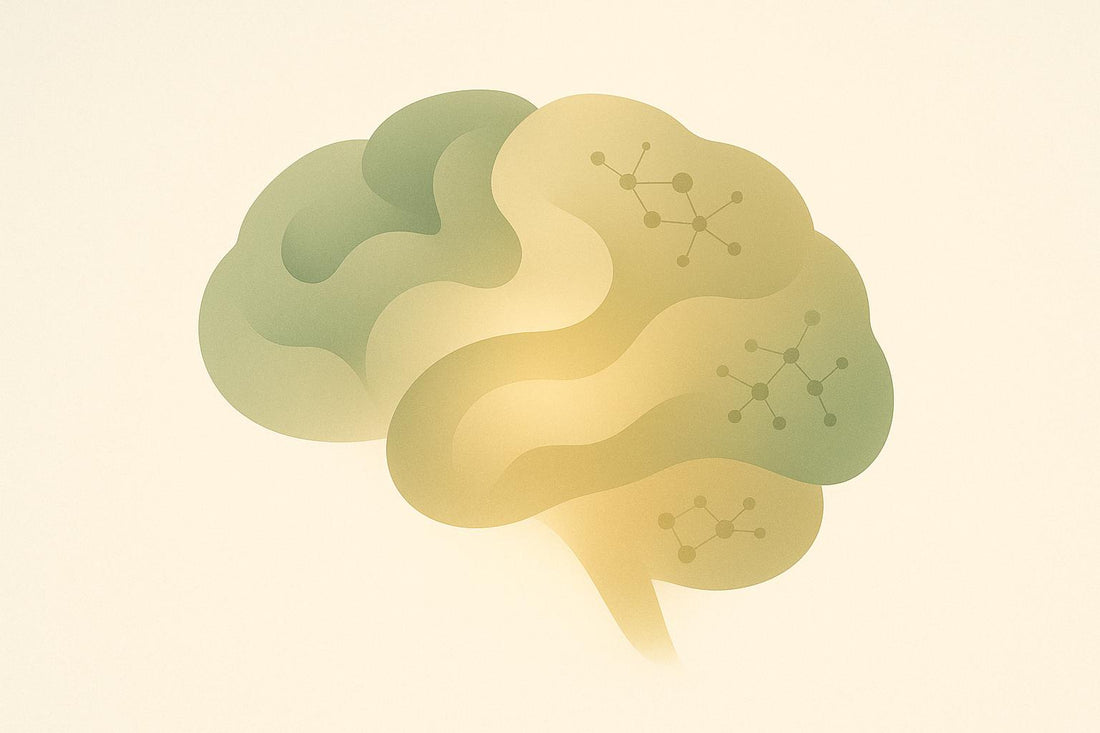Your sleep habits directly impact your brain health. Poor sleep - whether too little, too much, or irregular - can speed up cognitive decline and raise risks of Alzheimer's and dementia. On the flip side, quality sleep helps protect memory, repair neural connections, and clear harmful brain waste like beta-amyloid.
Key Takeaways:
- 7–9 hours of sleep is ideal for most adults; too little or too much harms brain function.
- Consistency matters: A regular sleep schedule supports memory and attention.
- Deep sleep is crucial: It clears toxins and repairs brain cells.
- Wearable devices can track sleep patterns to spot early cognitive issues.
For better brain health, stick to a consistent sleep routine, optimize your sleep environment, and consider supplements like NMN and Resveratrol for added support.
Impact of Sleep Disorders and Disturbed Sleep on Brain Health
Research Data: Sleep and Mental Decline
Studies have shown a connection between sleep habits - both in duration and regularity - and cognitive decline over time.
How Sleep Duration Affects the Brain
Both too little and too much sleep are linked to a drop in cognitive abilities. While sleep needs differ from person to person, sticking to consistent sleep hours can help protect brain function.
The Impact of Irregular Sleep Patterns
Unpredictable sleep schedules can hurt memory, attention span, and processing speed. Keeping a regular sleep-wake routine is crucial for maintaining mental sharpness. Research highlights how sticking to a schedule supports overall brain health.
Tools for Studying Sleep and the Brain
To study the link between sleep and brain function, researchers rely on tools like polysomnography, cognitive tests, and brain imaging. These methods help track sleep stages and detect subtle changes in brain activity, guiding the development of targeted sleep strategies explored later.
How Sleep Affects Brain Function
Sleep isn't just about rest - it’s when the brain takes care of critical tasks that keep it functioning properly.
Sleep and Brain Waste Removal
During sleep, the brain’s glymphatic system kicks into action. This system works like a cleanup crew, clearing out harmful proteins such as beta-amyloid, which are associated with Alzheimer's disease. By removing these toxins, the brain reduces their buildup and supports overall health. This nightly cleanup sets the stage for the brain’s other restorative processes.
Brain Repair During Sleep
Once the waste is cleared, sleep shifts its focus to repairing neural connections. Through protein synthesis and reduced inflammation, the brain strengthens its networks and keeps them running efficiently. Deep sleep, in particular, plays a crucial role in these repair activities, helping to maintain sharp cognitive abilities over time.
sbb-itb-4f17e23
Sleep Tracking Technology
Advances in sleep tracking technology now connect sleep patterns to cognitive health, helping to spot early signs of potential issues. Wearable devices have made it easier than ever to integrate this monitoring into daily life.
Sleep Data from Wearables
Wearable devices collect detailed information like heart rate variability, blood oxygen levels, movement, and sleep stage transitions. Over time, this data can highlight small changes in sleep patterns that might point to early cognitive challenges.
Using Sleep Data for Health
Tracking sleep over time can assist in predicting or even preventing cognitive conditions such as Alzheimer's. By establishing a consistent sleep baseline, doctors can better distinguish between normal variations and early indicators of decline. Research also supports the connection between steady sleep patterns and maintaining cognitive health.
This approach highlights how monitoring sleep can play a key role in identifying and addressing risks to cognitive well-being.
Steps to Improve Sleep Quality
Getting better sleep can help protect your brain and slow down mental decline. Here’s how to improve your sleep for sharper brain function.
Regular Sleep Schedule
A steady sleep routine helps keep your brain healthy by aligning with your natural body clock. To reduce risks tied to poor sleep:
- Aim for 7–9 hours of sleep each night
- Avoid screens for at least 2 hours before bed
- Start a relaxing wind-down routine 30–45 minutes before sleep
- Keep naps short (20–30 minutes) and avoid napping after 3 p.m.
Better Sleep Environment
Your bedroom setup plays a big role in how well you sleep. To create a restful space:
- Keep the room dark and minimize light exposure
- Set the temperature between 65–68°F (18–20°C)
- Maintain humidity levels between 30% and 50%
- Use white noise or soothing sounds to block out disruptions
- Choose a mattress and pillows that fit your sleep style
- Remove electronic devices from the bedroom
MASI Longevity Science Sleep Support

Good sleep hygiene is important, but supplements can also help. MASI Longevity Science offers high-quality options like NMN (1,000 mg) and Resveratrol (500 mg). These are made in Germany with pharmaceutical-grade materials and tested in Switzerland for purity.
"At MASI, we pride ourselves on offering the purest and highest quality products to support your health and longevity journey. Our supplements are manufactured to a standard not yet seen in the industry." [1]
These supplements support cellular repair and brain recovery during sleep. For adults over 40 worried about cognitive health, MASI’s products can complement a solid sleep routine. They’re vegan-friendly and free from common allergens, making them a thoughtful choice for long-term brain health.
Conclusion: Sleep's Role in Brain Health
Getting enough sleep on a regular schedule plays a big part in keeping your brain sharp and slowing down cognitive decline as you age. Quality sleep helps your brain carry out important maintenance tasks, which are crucial for staying mentally healthy over time.
For those aged 40 and older, MASI Longevity Science offers supplements designed to promote cellular repair while you sleep. These supplements work alongside your body's natural nighttime restoration processes to help maintain brain health.
Here are some tips to support your brain health:
- Stick to a regular sleep schedule
- Create a comfortable and quiet sleep environment
- Consider MASI's pharmaceutical-grade supplements for added support
- Dosage: one capsule daily for ages 40–50, and two capsules daily for ages 50+
FAQs
Can wearable devices help identify early signs of cognitive decline through sleep tracking?
Yes, wearable devices can play a role in identifying early signs of cognitive decline by monitoring sleep patterns. Research suggests that disruptions in sleep, such as irregular sleep cycles or reduced deep sleep, may be linked to an increased risk of cognitive decline, including conditions like Alzheimer's disease.
Wearable devices track metrics like sleep duration, quality, and cycles, offering insights that can help detect patterns associated with cognitive health. While these devices are not diagnostic tools, they provide valuable data that can prompt further medical evaluation or lifestyle adjustments to support brain health.
How can I optimize my sleep environment to support brain health and reduce cognitive decline risks?
Creating a sleep-friendly environment can play a crucial role in protecting brain health and potentially reducing the risk of cognitive decline. Here are some practical tips:
- Maintain a consistent sleep schedule: Aim to go to bed and wake up at the same time every day, even on weekends, to regulate your body's internal clock.
- Keep your bedroom cool, dark, and quiet: Use blackout curtains, white noise machines, or earplugs to minimize disruptions, and set your thermostat to a comfortable temperature (around 65°F is often ideal).
- Invest in a supportive mattress and pillows: Ensure your bed provides proper comfort and alignment to promote restful sleep.
- Limit screen time before bed: Reduce exposure to blue light from devices at least an hour before bedtime to support natural melatonin production.
By prioritizing quality sleep, you can help protect your brain's long-term health. For additional support, consider exploring science-backed supplements like those from MASI Longevity Science, designed to promote brain and overall health through cellular renewal.
Can supplements like NMN and Resveratrol help support brain health and recovery during sleep?
While the article does not specifically discuss how NMN and Resveratrol contribute to brain recovery during sleep, these compounds are known for their potential benefits in supporting cellular health and combating age-related decline. NMN (Nicotinamide Mononucleotide) is a precursor to NAD+, a molecule essential for energy production and cellular repair, which may indirectly support brain health. Resveratrol, a powerful antioxidant found in certain plants, is thought to protect cells from oxidative stress and support healthy aging processes.
For individuals interested in promoting brain health and overall vitality, incorporating science-backed supplements like NMN and Resveratrol into a balanced lifestyle may be worth exploring. Always consult with a healthcare professional before starting any new supplement regimen.




